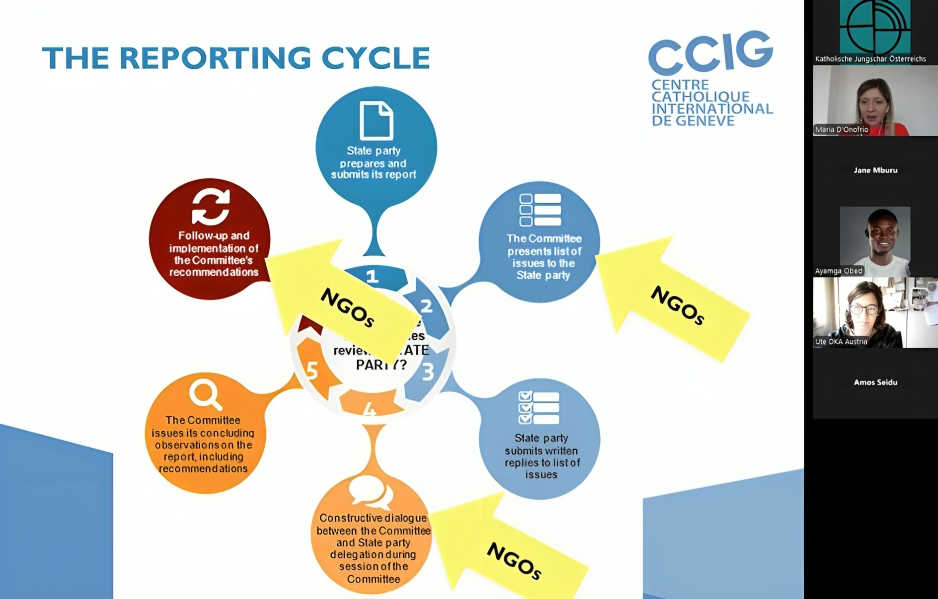
As part of the Human Rights Capacity-Building Project, executed by International Catholic Centre of Geneva (CCIG) and Dreikönigsaktion – Hilfswerk der Katholischen Jungschar (DKA Austria), an online training course on United Nations (UN) system for the protection of human rights was delivered in March 7-17, 2025, for civil society actors from Kenya and Ghana.
Civil society’s engagement is key to making the voices of the most vulnerable heard in the international fora. That is why it is important for CCIG to continue strengthening the capacity of local NGOs to fully benefit from the tools provided by the UN system to voice their concerns. For this reason, the primary goal of this one-year long project is to enable local and international civil society actors, specifically children’s rights defenders in Kenya and Ghana, to gain a more effective understanding and make use of the international UN mechanisms.
This online training consisted of three modules of two hours each, whose goal was to present the opportunities for NGO participation in relevant UN mechanisms, and to provide examples of possible advocacy activities by local civil society actors to be undertaken at the international level with the participation of children. Around 20 participants from 12 different local organizations in Kenya and Ghana, who work in their respective countries across a wide range of themes including food, education, health, good governance, climate justice, and more, took part in the training and other project activities.
Specifically, in Module I, participants were introduced to the UN mechanisms for the protection of human rights, with a special focus on the Human Rights Council (HRC). Module II introduced the Universal Periodic Review (UPR) and the opportunities civil society actors, including children, have to engage with the review. Finally, Module III focused on children’s rights protection through the UN Treaty Bodies, with particular attention to the Committee on the Rights of the Child (CRC). Throughout these online sessions, participants also had the opportunity to apply their knowledge and engage in interactive activities such as reading UPR reports and watching extracts of UPR sessions, with the aim to identify the most relevant recommendations for their contexts.
According to the evaluation survey, participants were satisfied with the training and consider it relevant and useful for their advocacy work. As one participant noted “The training has really transformed my knowledge on children and right protection, it has provided a solid ground for me to start learning more on the UN HR Mechanism, …”. For some of them, it was also valuable to have a clear purpose and objectives, contextual understanding, and opportunities for interaction during the sessions. Others also reported that the contents were very educational and insightful, and for most of them, appropriate to their prior knowledge. Ultimately, participants were grateful for receiving access to the materials after the training and stated that it motivated them to be more active in their local advocacy work.
Following this training, other project activities envisage the dissemination of UPR outcomes at the local level as well as the opportunity to deliver oral statements (OS) at the HRC. Selected participants among the training attendees will be accompanied through the preparation process and offered technical support by CCIG for undertaking such activities, which represent a great opportunity for local actors to voice their concerns and sensitize about the most urgent human rights issues affecting their communities.
We look forward to seeing the results and impact of this project and to encouraging more civil society actors to engage in international spaces to continue advocating for their communities’ human rights.